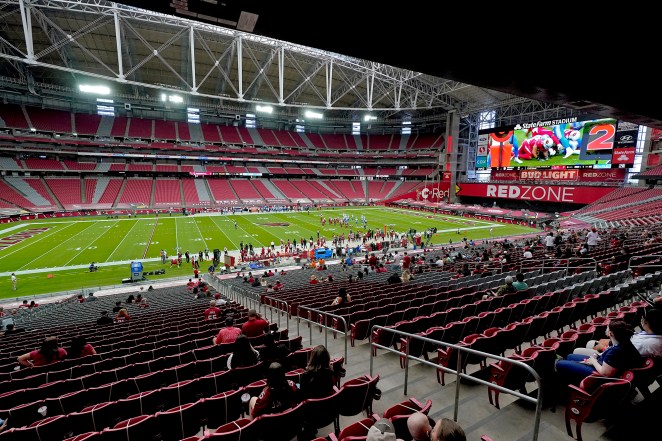To play offense in the NFL in 2020, keep your playbook near a dictionary, a map of the United States and a list of baby names.
COVID-19 restrictions mean no crowds at most games, no secrets on the field and no garbled quarterback pre-snap barking on the television. It’s not just defensive players who can more clearly hear every word at the line of scrimmage: Couch potato fans — and opponents — watching the broadcast hear enough off microphones to earn a decrypting degree.
So, changing code words for audibles and cue words in the cadence are more important than ever for an offense.
“That’s tricky, and we try to monitor it every week,” Giants quarterbacks coach Jerry Schuplinski said. “You can’t rearrange and have a new term for your guys every week. If you are not careful, they have those mics coming up over the huddle and you can almost make out the damn huddle call if you know what you are listening for.”
Rams quarterback Jared Goff sounded thirsty as he screamed for “Water! Water!” earlier this season. Derek Carr trolled his Raiders coach Jon Gruden with an audible call named after his wife. Jersey sales of Giants great Victor Cruz should skyrocket considering the countless times Daniel Jones shouts “Blue80!” in any given game.
Wait a second: Do the Raiders really have a “Cindy Gruden” play call? Not necessarily.
“We would watch back TV copies just to see what words were apparent on the broadcast to make sure we changed them up the following week,” said former NFL quarterback Brady Quinn, co-host of the SiriusXM Blitz. “It could be anything as simple as any boy’s name is inside-zone run to the right, girl’s name is inside-zone run to the left. Or cities and states. Or words with ‘R’ in them versus words with ‘L.’ ”
Thank the mandatory network microphones taped to the backs of centers and guards for the enhanced television audio and the forced “heightened consciousness” of verbiage, as Giants coach Joe Judge put it. Teams can pump in artificial crowd noise up to 70 decibels in fan-less stadiums, per league rules.
“It’s damn-near-dead silent before the snap,” Jets linebacker Jordan Jenkins said. “Some teams give fake calls and will use a run call in an obvious passing down. It’s something you can pick up on, but you have to do a fair amount of studying because sometimes you might think, ‘He said this, this play is coming,’ and then you look like a jack if it’s a totally opposite play.”
Former Buccaneers quarterback Chris Simms remembers thinking the Panthers were attuned to all his audibles. A few days later, Showtime’s “Inside the NFL” aired Panthers sideline audio discussing the signals, so he used those same words to mean something completely different in the rematch.
“Those are the mental gymnastics you do to screw over the other team,” Simms said. “But it’s very hard to pin signals to teams. It’s not as easy as baseball. There’s a fine line to when it’s too much to confuse your own guys at the line of scrimmage and when it’s just right.”
Common sense says quarterbacks shouting into microphones should be a defensive advantage. So, why is scoring on the rise?
Teams are averaging 25.4 points per game, which is two points higher than the NFL’s highest scoring season in 2013.
Quiet stadiums also mean no need for silent counts by an offense playing on the road, decreased likelihood of false-start penalties and other forms of miscommunication, and no frenzied fans to boost the defense’s energy.

“Why are all these 17-point leads being blown this year?” asked Simms, co-host of “Pro Football Talk Live.” “The offense feels no pressure anymore. On the road, there used to be crowd noise. Even when you are a home team down 17, there are no fans in the stadium so no anxiety or tension or ‘Boo! You suck!’ That’s leading quarterbacks and even the playcallers to not be affected.”
Silence allows quarterbacks to weaponize hard counts to create free plays by getting defensive players to jump the snap (100 offsides and neutral-zone infractions). In Week 3, the Packers’ Aaron Rodgers stole a key touchdown that way against the Saints.
“No silent counts, so guys can’t really cheat on the snap,” Jenkins said. “It makes the hard count that much more powerful.”
Because the NFL is full of paranoid personalities, the legwork involved in masking calls starts in the video department, but makes its way all the way up the ladder.
“I’ve always been involved with watching TV copies,” Judge said. “It’s not a new thing conceptually. Just, in the big picture, I think this year is a little bit different in terms of the amount of things you can actually hear. You’re looking for anything you can to help prepare your team and find an advantage.”